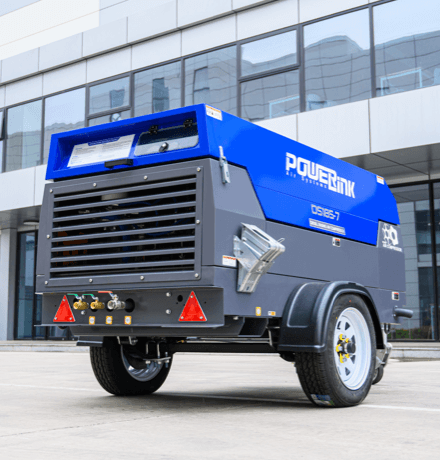In industries where compressed air is a critical part of daily operations, such as construction, mining, oil and gas, and agriculture—the decision to invest in a diesel air compressor can have a significant impact on productivity, cost-efficiency, and mobility. But is it the right choice for your business?
This article explores the advantages, drawbacks, and key considerations of using diesel-driven air compressors, helping you make an informed decision based on your specific operational needs.
What Is a Diesel Air Compressor?
A diesel air compressor is a type of mobile compressor powered by a diesel engine rather than electricity. These units are typically portable, rugged, and capable of delivering high volumes of compressed air without relying on a grid connection. Because of this, diesel compressors are especially popular on remote job sites and in industries where consistent access to electricity is not guaranteed.
Benefits of Diesel Air Compressors
1. Portability and Independence
One of the standout advantages of diesel compressors is their mobility. Since they don’t require a power outlet, these machines can operate in off-grid locations, making them ideal for construction sites, roadside repairs, and remote mining operations.
2. High Power Output
Diesel engines are known for their torque and fuel efficiency, especially under heavy loads. Diesel air compressors can deliver high airflow and pressure levels, which are often necessary for industrial tools and equipment such as jackhammers, sandblasters, and pneumatic drills.
3. Durability and Longevity
Built for tough environments, diesel compressors are typically constructed to withstand rugged conditions. With proper maintenance, a diesel-powered unit can offer years of reliable service, making it a worthwhile long-term investment for businesses that demand constant performance.
4. Lower Operating Costs in Specific Scenarios
In locations where electricity is expensive or unreliable, diesel can be a more cost-effective fuel source. For companies that operate in such conditions, switching to diesel may reduce downtime and improve job site efficiency.
Potential Drawbacks to Consider
1. Emissions and Environmental Regulations
Diesel engines emit more pollutants than their electric counterparts. If your business is operating in areas with strict environmental regulations or sustainability targets, this could be a limiting factor. While newer models come with cleaner emission technology, they may also come at a higher cost.
2. Noise Levels
Diesel compressors tend to be louder than electric models. For indoor use or noise-sensitive environments, this could be a major disadvantage unless sound-insulated versions are used.
3. Fuel Costs and Storage
While diesel can be cost-effective, fluctuating fuel prices and the need for on-site fuel storage can add logistical challenges. Businesses must also implement safety protocols for storing and handling diesel.
4. Maintenance Requirements
Diesel engines generally require more regular and specialized maintenance compared to electric compressors. This includes oil changes, filter replacements, and engine inspections—all of which can add to the total cost of ownership.
Key Considerations Before You Buy
When deciding whether a diesel air compressor is right for your business, ask the following:
Where will it be used? If you’re working in remote areas or mobile job sites, diesel offers flexibility electric models can’t match.
How much power do you need? Diesel compressors excel in high-demand applications.
What are your noise and emissions constraints? Urban or indoor jobs might call for quieter, cleaner alternatives.
Do you have the resources to maintain the equipment? Proper maintenance is crucial to longevity.
Conclusion
A diesel air compressor can be a smart investment for businesses that need mobility, high performance, and independence from the power grid. However, it’s not a one-size-fits-all solution. Evaluate your operational needs, environmental considerations, and long-term costs before making a purchase.
By doing your homework, you can ensure that your choice in compressed air technology not only meets your current needs but also supports the growth and efficiency of your business in the years to come. If you have any questions about our products, please feel free to contact us.




